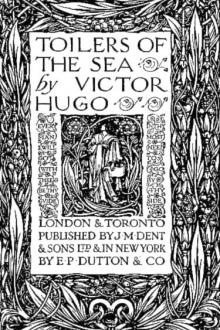Toilers of the Sea by Victor Hugo (trending books to read txt) 📕

- Author: Victor Hugo
- Performer: -
Book online «Toilers of the Sea by Victor Hugo (trending books to read txt) 📕». Author Victor Hugo
The engine had cost forty thousand francs.
Lethierry had himself constructed the "Devil Boat" upon the great covered stocks by the side of the first tower between St. Peter's Port and St. Sampson. He had been to Brême to buy the wood. All his skill as a shipwright was exhausted in its construction; his ingenuity might be seen in the planks, the seams of which were straight and even, and covered with sarangousti, an Indian mastic, better than resin. The sheathing was well beaten. To remedy the roundness of the hull, Lethierry had fitted out a boom at the bowsprit, which allowed him to add a false spritsail to the regular one. On the day of the launch, he cried aloud, "At last I am afloat!" The vessel was successful, in fact, as the reader has already learnt.
Either by chance or design she had been launched on the 14th of July, the anniversary of the taking of the Bastille. On that day, mounted upon the bridge between the two paddle-boxes, looked Lethierry upon the sea, and exclaimed, "It is your turn now! The Parisians took the Bastille, now science takes the sea."
Lethierry's boat made the voyage from Guernsey to St. Malo once a week. She started on the Tuesday morning, and returned on the Friday evening, in time for the Saturday market. She was a stronger craft than any of the largest coasting sloops in all the Archipelago, and her capacity being in proportion to her dimensions, one of her voyages was equal to four voyages of an ordinary boat in the same trade; hence they were very profitable. The reputation of a vessel depends on its stowage, and Lethierry was an admirable stower of cargo. When he was no longer able to work himself, he trained up a sailor to undertake this duty. At the end of two years, the steamboat brought in a clear seven hundred and fifty pounds sterling a year, or eighteen thousand francs. The pound sterling of Guernsey is worth twenty-four francs only, that of England twenty-five, and that of Jersey twenty-six. These differences are less unimportant than they seem: the banks, at all events, know how to turn them to advantage.
VI LETHIERRY'S EXALTATIONThe "Devil Boat" prospered. Mess Lethierry began to look forward to the time when he should be called "Monsieur." At Guernsey, people do not become "Monsieurs" at one bound. Between the plain man and the gentleman, there is quite a scale to climb. To begin with, we have the simple name, plain "Peter," let us suppose; the second step is "Neighbour Peter;" the third, "Father Peter;" the fourth, "Sieur Peter;" the fifth, "Mess Peter;" and then we reach the summit in "Monsieur Peter."
This scale ascending thus from the ground is carried to still greater heights. All the upper classes of England join on and continue it. Here are the various steps, becoming more and more glorious. Above the Monsieur, or "Mr.," there is the "Esquire;" above the squire, the knight; above the knight, still rising, we have the baronet, the Scotch laird, the baron, the viscount, the earl (called count in France, and jarl in Norway); the marquis, the duke, the prince of the blood royal, and the king: so, by degrees, we ascend from the people to the middle class, from the middle class to the baronetage, from the baronetage to the peerage, from the peerage to royalty.
Thanks to his successful ingenuity, thanks to steam, and his engines, and the "Devil Boat," Mess Lethierry was fast becoming an important personage. When building his vessel he had been compelled to borrow money. He had become indebted at Brême, he had become indebted at St. Malo; but every year he diminished his obligations.
He had, moreover, purchased on credit, at the very entrance to the port of St. Sampson, a pretty stone-built house, entirely new, situate between the sea and a garden. On the corner of this house was inscribed the name of the "Bravées." Its front formed a part of the wall of the port itself, and it was remarkable for a double row of windows: on the north, alongside a little enclosure filled with flowers, and on the south commanding a view of the ocean. It had thus two façades, one open to the tempest and the sea, the other looking into a garden filled with roses.
These two frontages seemed made for the two inmates of the house—Mess Lethierry and Déruchette.
The "Bravées" was popular at St. Sampson, for Mess Lethierry had at length become a popular man. This popularity was due partly to his good nature, his devotedness, and his courage; partly to the number of lives he had saved; and a great deal to his success, and to the fact that he had awarded to St. Sampson the honour of being the port of the departure and arrival of the new steamboat. Having made the discovery that the "Devil Boat" was decidedly a success, St. Peter's, the capital, desired to obtain it for that port, but Lethierry held fast to St. Sampson. It was his native town. "It was there that I was first pitched into the water," he used to say; hence his great local popularity. His position as a small landed proprietor paying land-tax, made him, what they call in Guernsey, an unhabitant. He was chosen douzenier. The poor sailor had mounted five out of six steps of the Guernsey social scale; he had attained the dignity of "Mess"; he was rapidly approaching the Monsieur; and who could predict whether he might not even rise higher than that? who could say that they might not one day find in the almanack of Guernsey, under the heading of "Nobility and Gentry," the astonishing and superb inscription,—Lethierry, Esq.?
But Mess Lethierry had nothing of vanity in his nature, or he had no sense of it; or if he had, disdained it: to know that he was useful was his greatest pleasure; to be popular touched him less than being necessary; he had, as we have already said, only two objects of delight, and consequently only two ambitions: the Durande and Déruchette.
However this may have been, he had embarked in the lottery of the sea, and had gained the chief prize.
This chief prize was the Durande steaming away in all her pride.
VII THE SAME GODFATHER AND THE SAME PATRON SAINTHaving created his steamboat, Lethierry had christened it: he had called it Durande—"La Durande." We will speak of her henceforth by no other name; we will claim the liberty, also, in spite of typographical usage, of not italicising this name Durande; conforming in this to the notion of Mess Lethierry, in whose eyes La Durande was almost a living person.
Durande and Déruchette are the same name. Déruchette is the diminutive.
This diminutive is very common in France.
In the country the names of saints are endowed with all these diminutives as well as all their augmentatives. One might suppose there were several persons when there is, in fact, only one. This system of patrons and patronesses under different names is by no means rare. Lise, Lisette, Lisa, Elisa, Isabelle, Lisbeth, Betsy, all these are simply Elizabeth. It is probable that Mahout, Maclou, Malo, and Magloire are the same saint: this, however, we do not vouch for.
Saint Durande is a saint of l'Angoumois, and of the Charente; whether she is an orthodox member of the calendar is a question for the Bollandists: orthodox or not, she has been made the patron saint of numerous chapels.
It was while Lethierry was a young sailor at Rochefort that he had made the acquaintance of this saint, probably in the person of some pretty Charantaise, perhaps in that of the grisette with the white nails. The saint had remained sufficiently in his memory for him to give the name to the two things which he loved most—Durande to the steamboat, Déruchette to the girl.
Of one he was the father, of the other the uncle.
Déruchette was the daughter of a brother who had died: she was an orphan child: he had adopted her, and had taken the place both of father and mother.
Déruchette was not only his niece, she was his godchild; he had held her in his arms at the baptismal font; it was he who had chosen her patron saint, Durande, and her Christian name, Déruchette.
Déruchette, as we have said, was born at St. Peter's Port. Her name was inscribed at its date on the register of the parish.
As long as the niece was a child, and the uncle poor, nobody took heed of her appellation of Déruchette; but when the little girl became a miss, and the sailor a gentleman, the name of Déruchette shocked the feelings of Guernsey society. The uncouthness of the sound astonished every one. Folks asked Mess Lethierry "why Déruchette?" He answered, "It is a very good name in its way." Several attempts were made to get him to obtain a change in the baptismal name, but he would be no party to them. One day, a fine lady of the upper circle of society in St. Sampson, the wife of a rich retired ironfounder, said to Mess Lethierry, "In future, I shall call your daughter Nancy."
"If names of country towns are in fashion," said he, "why not Lons le Saulnier?" The fine lady did not yield her point, and on the morrow said, "We are determined not to have it Déruchette; I have found for your daughter a pretty name—Marianne." "A very pretty name, indeed," replied Mess Lethierry, "composed of two words which signify—a husband and





Comments (0)